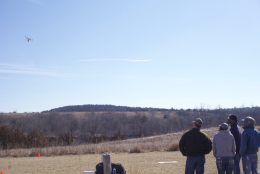Agronomy is the study of plants and soils and their environment. Before I began working at the Department of Agronomy, I had no idea how it was different than any other agricultural science. Now, I struggle to put it into words for the opposite reason. Agronomy is too complex, too interesting of a science to put into one definition, and I’m the communications intern.
I first heard about the internship from my advisor, Dr. Lauri Baker, in July 2016. They were looking for an agricultural communications student to be their communications intern to work during the school year. I’ve worked there ever since. I really enjoy the environment at the department. My supervisor is the department head, Dr. Gary Pierzynski. However, I work for anyone in the department that wants help with a communications project. My main task is managing the department’s Twitter, Facebook and Instagram accounts. I have also helped with making educational videos, designing posters for displays, taking photos out in the field, greenhouses or even of drones flying through the air, writing articles and press releases, working on the departmental website and so much more. One of my favorite things is that I get to work with so many different people.
Caption: Just another day in Agronomy. I got to go out and capture photos of the UAS270 class flying drones as part of the precision agriculture option.
I also love learning more about agronomy each day that I work there. One of my first few weeks there, the eUpdate editor at the time, Steve Watson, asked me to tweet an eUpdate article and to find a generic photo of wheat to go along with it. After about a minute, I had tweeted the article with a close-up photo of what I thought was wheat. After about half an hour and several engagements on the tweet later, Steve turns to me and says “Danielle, that’s not a photo of wheat.” It turns out, the photo that I thought was a pretty photo of wheat was missing the awns, or as I fondly refer to them, the spiky things. He quickly took the tweet down and put up one with a correct photo.
Caption: K-State bred wheat variety Everest with awns. Photo courtesy of agfax.com.
While it was quite embarrassing, that is something I may have never learned if I had not worked at the agronomy department. Also in my time there, I have learned to never, under any circumstances, call soil “dirt.” It is virtually a sin to use such a derogatory word for one of Earth’s most precious and valuable resources.
I really enjoy getting to do so many aspects of communications. It ensures I never get bored with my job. I have been able to gain experience in social media and gathering analytics from various platforms, while the next day you can find me in the field trying to find the best angle to shoot video of a field of whatever crop is growing at that time. I recently just tried my first hand at advertising on social media. Each day is different. I get to work with a variety of audiences as well. The Twitter account mostly targets practicing farmers and agronomic professionals. I work with student recruitment and our other two social media platforms target prospective and current students, which is a whole new age group. I even get to work with kids when we promote and hold the Agronomy Kids’ Field Day. All in all, it’s a valuable experience that would be hard to find anywhere else.
Caption: Manhattan elementary school students learning about soil at the Agronomy Kids’ Field Day.
A final aspect that is truly great about my internship at the agronomy department is that I can present new ideas and the people I work with are always willing to listen to those ideas and help me put them into action. As an example, when I started the job, the department did not have an Instagram page. I presented the idea to my bosses and described the value an Instagram account could hold for gaining students in the program. While they had little knowledge of the social media platform, they trusted me and let me implement the idea. That was just my first day on the job! Often as an intern and student, it becomes easy to feel undervalued. I appreciate that the people I work with treat me as a colleague, and not just as a student. I have been working at the department for two years now and hope to work there until I graduate. I learn something new each day, whether it be about agronomy or about being the best person I can be. I would recommend this job to anyone, not simply because it’s a good, paying job, but also because the people and experiences are almost impossible to beat.





